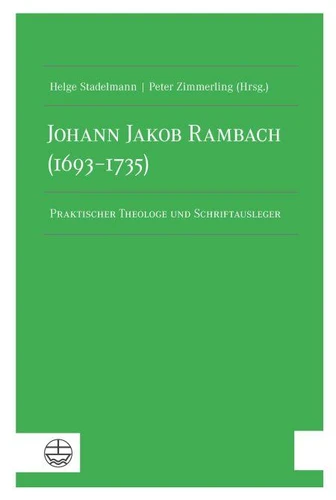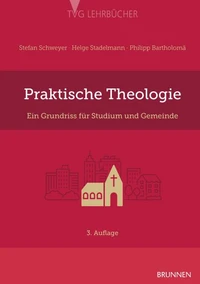Johann Jakob Rambach (1693–1735). Praktischer Theologe und Schriftausleger
Par : ,Formats :
Disponible dans votre compte client Decitre ou Furet du Nord dès validation de votre commande. Le format ePub est :
- Compatible avec une lecture sur My Vivlio (smartphone, tablette, ordinateur)
- Compatible avec une lecture sur liseuses Vivlio
- Pour les liseuses autres que Vivlio, vous devez utiliser le logiciel Adobe Digital Edition. Non compatible avec la lecture sur les liseuses Kindle, Remarkable et Sony
 , qui est-ce ?
, qui est-ce ?Notre partenaire de plateforme de lecture numérique où vous retrouverez l'ensemble de vos ebooks gratuitement
Pour en savoir plus sur nos ebooks, consultez notre aide en ligne ici
- Nombre de pages232
- FormatePub
- ISBN978-3-374-06222-5
- EAN9783374062225
- Date de parution31/12/2019
- Protection num.Digital Watermarking
- Taille983 Ko
- Infos supplémentairesepub
- ÉditeurEvangelische Verlagsanstalt
Résumé
Johann Jakob Rambach (1693-1735) war der wohl bekannteste Theologieprofessor seiner Zeit und galt als ein bedeutender Vertreter des lutherischen Barockpietismus. Zunächst Nachfolger von A. H. Francke in Halle, wurde er später Professor an der Theologischen Fakultät in Gießen, Leiter des dortigen Pädagogiums und Superintendent für Mittelhessen. Manche seiner Kirchenlieder sind bis heute bekannt ("Ich bin getauft auf seinen Namen", "Der Herr ist gut, in dessen Dienst wir stehn").
Seine Hermeneutik und Homiletik waren Standardtexte bis ins 19. Jahrhundert hinein. Trotzdem ist Rambach heute weithin vergessen. Seine zahlreichen Schriften aus dem Bereich von Hemeneutik, Homiletik, Katechetik, Hymnologie, Moraltheologie und Apologetik sind noch wenig erforscht. Die Beiträge des Buches, die auf ein Forschungs-Symposium zurückgehen, erschließen Rambach als originellen Denker zwischen Reformorthodoxie, Pietismus und Frühaufklärung. [Johann Jakob Rambach (1693-1735).
Practical Theologian and Exegete] Johann Jakob Rambach (1693-1735) probably was the most wellknown theologian of his time and was esteemed as a prominent representative of Lutheran baroque pietism. Having initially served as the successor of A. H. Francke in Halle, he was called as Professor of the Theological Faculty of Giessen, Director of the higher pedagogical institution there, and as Superintendent of the church-district Middle Hessen.
Some of his hymns are still well-known today ("Ich bin getauft auf seinen Namen", "Der Herr ist gut, in dessen Dienst wir stehn"). His hermeneutical and homiletical books were used as standard texts till the 19th century. Nevertheless, Rambach is forgotten widely today. His numerous publications in the areas of hermeneutics, homiletics, catechetics, hymnology, moral theology, and apologetics have scarcely been studied.
The articles in this book, originally presented in a research-symposium, make Rambach accessible as an original thinker in interaction with reform-orthodoxy, pietism, and early enlightenment.
Seine Hermeneutik und Homiletik waren Standardtexte bis ins 19. Jahrhundert hinein. Trotzdem ist Rambach heute weithin vergessen. Seine zahlreichen Schriften aus dem Bereich von Hemeneutik, Homiletik, Katechetik, Hymnologie, Moraltheologie und Apologetik sind noch wenig erforscht. Die Beiträge des Buches, die auf ein Forschungs-Symposium zurückgehen, erschließen Rambach als originellen Denker zwischen Reformorthodoxie, Pietismus und Frühaufklärung. [Johann Jakob Rambach (1693-1735).
Practical Theologian and Exegete] Johann Jakob Rambach (1693-1735) probably was the most wellknown theologian of his time and was esteemed as a prominent representative of Lutheran baroque pietism. Having initially served as the successor of A. H. Francke in Halle, he was called as Professor of the Theological Faculty of Giessen, Director of the higher pedagogical institution there, and as Superintendent of the church-district Middle Hessen.
Some of his hymns are still well-known today ("Ich bin getauft auf seinen Namen", "Der Herr ist gut, in dessen Dienst wir stehn"). His hermeneutical and homiletical books were used as standard texts till the 19th century. Nevertheless, Rambach is forgotten widely today. His numerous publications in the areas of hermeneutics, homiletics, catechetics, hymnology, moral theology, and apologetics have scarcely been studied.
The articles in this book, originally presented in a research-symposium, make Rambach accessible as an original thinker in interaction with reform-orthodoxy, pietism, and early enlightenment.
Johann Jakob Rambach (1693-1735) war der wohl bekannteste Theologieprofessor seiner Zeit und galt als ein bedeutender Vertreter des lutherischen Barockpietismus. Zunächst Nachfolger von A. H. Francke in Halle, wurde er später Professor an der Theologischen Fakultät in Gießen, Leiter des dortigen Pädagogiums und Superintendent für Mittelhessen. Manche seiner Kirchenlieder sind bis heute bekannt ("Ich bin getauft auf seinen Namen", "Der Herr ist gut, in dessen Dienst wir stehn").
Seine Hermeneutik und Homiletik waren Standardtexte bis ins 19. Jahrhundert hinein. Trotzdem ist Rambach heute weithin vergessen. Seine zahlreichen Schriften aus dem Bereich von Hemeneutik, Homiletik, Katechetik, Hymnologie, Moraltheologie und Apologetik sind noch wenig erforscht. Die Beiträge des Buches, die auf ein Forschungs-Symposium zurückgehen, erschließen Rambach als originellen Denker zwischen Reformorthodoxie, Pietismus und Frühaufklärung. [Johann Jakob Rambach (1693-1735).
Practical Theologian and Exegete] Johann Jakob Rambach (1693-1735) probably was the most wellknown theologian of his time and was esteemed as a prominent representative of Lutheran baroque pietism. Having initially served as the successor of A. H. Francke in Halle, he was called as Professor of the Theological Faculty of Giessen, Director of the higher pedagogical institution there, and as Superintendent of the church-district Middle Hessen.
Some of his hymns are still well-known today ("Ich bin getauft auf seinen Namen", "Der Herr ist gut, in dessen Dienst wir stehn"). His hermeneutical and homiletical books were used as standard texts till the 19th century. Nevertheless, Rambach is forgotten widely today. His numerous publications in the areas of hermeneutics, homiletics, catechetics, hymnology, moral theology, and apologetics have scarcely been studied.
The articles in this book, originally presented in a research-symposium, make Rambach accessible as an original thinker in interaction with reform-orthodoxy, pietism, and early enlightenment.
Seine Hermeneutik und Homiletik waren Standardtexte bis ins 19. Jahrhundert hinein. Trotzdem ist Rambach heute weithin vergessen. Seine zahlreichen Schriften aus dem Bereich von Hemeneutik, Homiletik, Katechetik, Hymnologie, Moraltheologie und Apologetik sind noch wenig erforscht. Die Beiträge des Buches, die auf ein Forschungs-Symposium zurückgehen, erschließen Rambach als originellen Denker zwischen Reformorthodoxie, Pietismus und Frühaufklärung. [Johann Jakob Rambach (1693-1735).
Practical Theologian and Exegete] Johann Jakob Rambach (1693-1735) probably was the most wellknown theologian of his time and was esteemed as a prominent representative of Lutheran baroque pietism. Having initially served as the successor of A. H. Francke in Halle, he was called as Professor of the Theological Faculty of Giessen, Director of the higher pedagogical institution there, and as Superintendent of the church-district Middle Hessen.
Some of his hymns are still well-known today ("Ich bin getauft auf seinen Namen", "Der Herr ist gut, in dessen Dienst wir stehn"). His hermeneutical and homiletical books were used as standard texts till the 19th century. Nevertheless, Rambach is forgotten widely today. His numerous publications in the areas of hermeneutics, homiletics, catechetics, hymnology, moral theology, and apologetics have scarcely been studied.
The articles in this book, originally presented in a research-symposium, make Rambach accessible as an original thinker in interaction with reform-orthodoxy, pietism, and early enlightenment.






